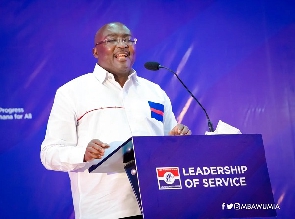 Vice President, Dr Mahamudu Bawumia
Vice President, Dr Mahamudu Bawumia
Given the fact that there was no ecumenically diffused coronavirus or Ukraine/Russia impasse during the Mahama administration, and yet Ghanaians experienced extremely harsh conditions amid corruption allegations (Bus branding, Brazil World Cup, SADA, SUBA, GYEEDA, SSNIT, MASLOC, NCA, Ford Expedition Vehicle, amongst others), it was not surprising a bit when the unhappy 56.5 % of the electorates consciously voted Mahama out in 2016 and 51.2% of Ghanaians voted against him in 2020.
If you may recall, in his last days in government, former President Mahama honestly told Ghanaians that his NDC administration had licentiously ‘consumed all the meat on the bone’.
The former president was apparently conveying to Ghanaians that his administration had engaged in profligate spending thereby emptying the national coffers.
Disappointingly, former President Mahama managed to uproot the good foundation laid by President Kufuor and the late Mills.
The Mahama administration fecklessly doled out Ghana’s scarce resources to party apologists instead of purchasing fuel to generate power and for well over four years, dumsor unfortunately crippled businesses.
The dumsor was so annoying to the extent that my uneducated, albeit reflective-thinking mum, who had a soft spot for NDC, underwent a carefully considered reflection and graciously detached herself from the Umbrella fraternity.
I cannot for the life of me, get my head around how and why anyone calling him/herself a reflective thinker can proclaim somewhat anecdotally that Ghana’s economy under Mahama/Amissah (3.4% growth and 15.4% inflation) was better than Akufo-Addo/Bawumia record before the pernicious coronavirus and Russia/Ukraine conflict(8.6% growth and 7.5% inflation).
The fact of the matter is that before the inexpressible coronavirus, the Akufo-Addo/Bawumia administration efficiently raised economic growth. Ghana’s economy grew provisionally by 8.5 percent in 2017 compared to 3.7 percent in 2016 under Mahama/Amissah(Ghana Statistical Service, 2018).
Ghana’s economy, as a matter of fact, received thumbs-up from the likes of the then Director of the International Monetary Fund (IMF), Ms. Christine Lagarde, the United Nations Special Rapporteur on extreme poverty and human rights, Philip Alston, and other reputable international organizations, who had earlier commended the Akufo-Addo/Bawumia administration on the excellent economic performance in the three and half years in office.
In 2017, Bloomberg News, for example, predicted Ghana to become “Africa’s fastest-growing economy in 2018 “and Ghana was proclaimed “Star of Africa in 2018 Lenders’ Economic Forecasts”.
Reporting on the same fiscal policy achievements, Le Monde pointed out that “Ghana’s economic success is not just as the result of an oil-driven boom, but is also due to prudent economic management, an entrepreneurial population, the role of traditional leaders, and good governance.”
The then Director of the International Monetary Fund (IMF), Ms Christine Lagarde observed that the Ghanaian economy, before the insidious coronavirus, was in a better place than it was in the previous years under the John Dramani Mahama’s administration.
Ms. Lagarde opined that the Akufo-Addo/Bawumia administration made important gains towards macroeconomic stability, including inflation, which declined to a single digit and within the Bank of Ghana’s (BoG’s) tolerance band; buoyant growth, averaging about five percent between 2015 and 2018, and, over six percent in 2017-18) and a primary surplus in 2017 for the first time in 15 years (IMF 2018).
Ghana’s economic growth, just before the unspeakable coronavirus, stood at around 8.6% from 3.4% in December 2016.
Interestingly, in the first two years of the Akufo-Addo/Bawumia administration, the Industry sector recorded the highest growth rate of 16.7 percent, followed by Agriculture at 8.4 percent and Services at 4.3 percent.
Services share of GDP decreased from 56.8 percent in 2016 to 56.2 percent in 2017. The sector's growth rate also decreased from 5.7 percent in 2016 to 4.3 percent in 2017.
However, two of the subsectors in the services sector recorded double-digit growth rates, including Information and Communication at 13.2 percent and Health and Social Work at 14.4 percent.
The Industry sector, the highest-growing sector with a GDP share of 25.5 percent, had its growth rate increasing from -0.5 percent in 2016 to 16.7 percent in 2017.
The Mining and Quarrying subsector recorded the highest growth of 46.7 percent in 2017.
The Agriculture sector expanded from a growth rate of 3.0 percent in 2016 to 8.4 percent in 2017. Its share of GDP, however, declined from 18.7 percent in 2016 to 18.3 percent in 2017. Crops remain the largest activity with a share of 14.2 percent of GDP.
The Non-Oil annual GDP growth rate decreased from 5.0 percent in 2016 to 4.9 percent in 2017. The 2017 Non-oil GDP for industry recorded a growth rate of 0.4 percent, compared with 4.9 percent in 2016. Growth in the fourth quarter of 2017 reached 8.1 percent compared to 9.7 percent in the third quarter (GSS, 2018).
Some of us have always held an unadulterated conviction that governance is a serious business and as such it requires forward forward-thinking, serious, and committed group of people to bring about the needed progress.
Nevertheless, this has not always been the case in Ghana’s democratic dispensation. The multi-party democracy has given birth to both purposeful and coarse political parties.
As a consequence, we have been relying on lousy economic managers who have only succeeded in sinking the economy deeper and deeper into the mire.
Truly, it was during the Mahama administration that Ghana came under the throes of economic collapse in the absence of the pandemic or the Ukraine/Russia impasse.